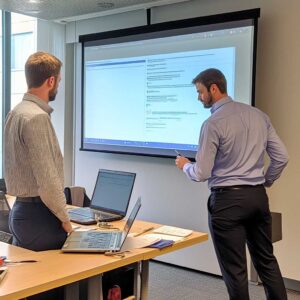
Onboarding has always been a critical phase in the employee lifecycle, setting the stage for long-term success. Traditionally, this process took place in person, with HR teams guiding new hires through orientation sessions, benefits enrollment, team introductions, and training. However, as remote work environments become more commonplace, HR departments face the challenge of adapting their onboarding strategies to virtual platforms.
In this guide, we will discuss how virtual HR seminars can facilitate seamless remote employee integration, highlighting the best practices, benefits, and practical steps to create a positive and productive onboarding experience.
The Evolution of Onboarding: From In-Person to Virtual
Before we dive into the specifics of virtual onboarding, it’s essential to understand how the role of HR has changed in recent years. The shift toward remote work, accelerated by global events and technological advancements, has forced companies to rethink traditional processes, including employee training and onboarding.
The HR certification programs that once focused on face-to-face interactions are now evolving to incorporate online learning, webinars, and virtual seminars, adapting to a new world of remote employee engagement. These virtual seminars are a powerful tool to connect employees to their company’s culture, policies, and training materials—all from the comfort of their home offices.
As organizations look for ways to ensure smooth and effective remote onboarding, HR certification courses have become an essential part of HR professionals’ learning paths, helping them stay ahead of these changes and best serve their remote teams.
Why Virtual HR Seminars Are Crucial for Onboarding
Virtual HR certificate programs help HR departments streamline the onboarding process, making it easier to introduce new employees to company culture, policies, tools, and expectations.
The main goal of virtual onboarding is to ensure that remote employees feel like they are part of the organization from day one. Here are a few reasons why virtual HR seminars are crucial for seamless remote onboarding:
- Consistency and Standardization
A key challenge of onboarding is ensuring that all new hires, regardless of location, receive the same level of training and information. Virtual seminars allow organizations to provide consistent onboarding experiences that are scalable and standardized, ensuring all remote employees have access to the same quality of training, regardless of where they are located. - Accessibility and Flexibility
Remote employees often have diverse schedules, time zones, and personal commitments. Virtual onboarding allows for asynchronous learning, where new hires can access training sessions and materials at their convenience. HR departments can create on-demand training materials, recorded seminars, and digital resources that employees can access whenever necessary, allowing them to move through the onboarding process at their own pace. - Cost-Effectiveness
By transitioning onboarding processes to a virtual format, companies can save costs related to travel, accommodation, and venue rentals. Virtual HR certificate programs also provide a more affordable way for companies to invest in training, as many seminar providers offer scalable, online modules to accommodate a wide range of budgets.
Best Practices for Virtual HR Onboarding
When it comes to virtual HR seminars for onboarding, there are several best practices to ensure the experience is effective, engaging, and beneficial to both the new hire and the company. Here’s how you can create a seamless remote employee integration:
1. Prepare Pre-Training Materials
Before the virtual seminar begins, send new hires pre-training materials. This may include an overview of the company’s history, mission, values, policies, and other important information. Preparing employees ahead of time helps to ensure that they are ready to dive into the seminar and can engage in more meaningful discussions once the session starts.
2. Use Interactive Platforms and Tools
Interactive platforms are essential to keep remote employees engaged during virtual seminars. Tools like breakout rooms, live polls, quizzes, and chat features allow employees to interact with one another and with trainers. These platforms not only make the learning experience more engaging but also help build camaraderie among new team members.
Using a platform like Zoom or Microsoft Teams allows HR teams to host virtual seminars with features such as live Q&A sessions, polls, and virtual icebreakers, ensuring employees can actively participate and communicate.
3. Offer a Personalized Experience
Make virtual onboarding as personalized as possible. Assign mentors or onboarding buddies who can guide new employees through the initial stages of their remote journey. This can help alleviate any feelings of isolation or confusion that can arise when working remotely.
Example:
Pair each new hire with a mentor from a similar department or role who can help answer questions, provide guidance, and make the new employee feel welcomed and supported.
4. Break Content Into Bite-Sized Sessions
Remote employees may struggle with long, monotonous virtual seminars. Breaking down content into shorter, focused segments helps prevent information overload.
Instead of a full-day seminar, consider breaking it up into multiple, shorter sessions spread out over a week or two. This keeps employees engaged and ensures that they retain key information. Rather than a full-day orientation, schedule a one-hour session per day covering different topics—such as company culture, HR policies, and technical systems.
5. Promote Interactive Discussions and Networking
While remote work may lack the face-to-face interaction of in-person onboarding, it’s essential to create opportunities for new hires to network and engage with others. Encourage open discussions, share experiences, and foster connections through virtual group activities or chat channels.
Virtual networking sessions where employees can meet others in different departments or have casual lunch meetings via video calls will help new hires feel more connected to their coworkers.
The Role of HR Certification Programs in Onboarding
As companies continue to prioritize virtual onboarding, many are incorporating HR certification courses into their training programs to enhance employee skills and knowledge. These programs help HR teams provide more comprehensive training during the onboarding process, ensuring new hires are equipped with the knowledge they need to succeed in their roles.
HR certification programs allow HR professionals to stay up-to-date with the latest legal and regulatory changes that affect employee onboarding. They can also help HR teams create more efficient and effective training programs for virtual environments.
At IAML, we provide HR certificate programs that are specifically designed to address the needs of remote onboarding, focusing on key areas such as compliance, employee benefits, and organizational culture. These programs offer interactive, hands-on experiences to engage participants and ensure they gain the skills and knowledge necessary to integrate new employees into the workforce.
Why IAML’s Virtual HR Seminars Stand Out
IAML’s virtual HR certification programs provide comprehensive and interactive learning experiences tailored to the challenges of remote onboarding. With nationally recognized instructors, flexible learning options, and in-depth course materials, IAML ensures that every participant has the tools they need to succeed in virtual HR seminars.
Key Benefits of IAML’s Virtual Programs:
- Dedicated Time for Interaction: Ample time is provided for participants to ask questions and engage with instructors, fostering meaningful discussions and a collegial learning atmosphere.
- Reduced Legal Risk: IAML programs equip HR professionals with the knowledge to reduce their organization’s legal risks, especially in compliance and employee benefits.
- Valuable Certificate: Upon completing the program, participants are awarded a certificate, providing them with a credential to demonstrate their expertise in HR practices.
- Enhanced Career Growth: By improving HR knowledge and skills, participants increase their job performance and capacity for career advancement.
Through these virtual HR seminars, IAML helps organizations integrate new employees with the right training, equipping them to thrive in a remote work environment.
With the right tools, training, and resources, companies can ensure their remote employees are set up for success from day one. Explore IAML’s programs designed to equip you with the expertise to navigate employee integration with confidence.


